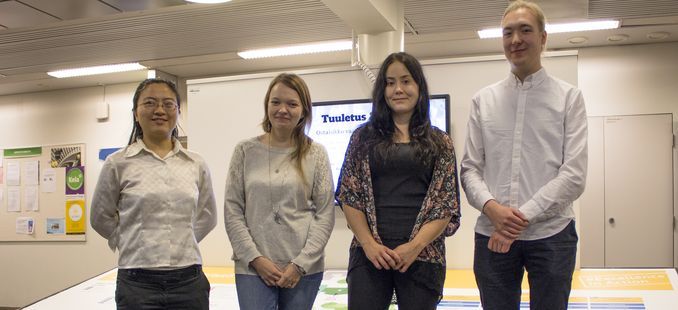
An idea on circular economy takes students to the Slush stage
A multidisciplinary team of students discovered that mushrooms offer a solution for the reuse of waste textiles. This week they will compete with their idea at the leading startup event in Europe.
At Sepänkatu, the room is full of smiling faces. TUAS’ students Julius Alisaari and Tytti Salminen and students Mira Valkjärvi and Qing Cao from Turku School of Economics heard a couple of days ago that they will get to perform at Slush. The opportunity is huge and it’s hard to hide the excitement.
In September, the TeMu Fabrics team of the students won the Textile Hackathon organized by the Textile 2.0 project. In the hackathon, the task was to brainstorm solutions to the challenges related to the circular economy of textiles. The winning idea was a sum of experiences.
“The thought started from bacteria and ended up in mushrooms”, laughs Julius Alisaari, a 3rd-year student in Energy and Environmental Engineering.
Mira Valkjärvi, who will soon complete her Master’s degree, says that she studied circular economy for her Master’s thesis. She came upon a book which described how a desert was turned into a rainforest with the help of mushrooms. She brought forward the idea on utilizing mushrooms, and the rest of the group became enthusiastic right away.
“We take on textile waste which cannot be utilized in any other way. In it, we grow mushrooms in suitable circumstances and turn it into leather”, Valkjärvi sums up the idea of the team.
Slush calling
At Messukeskus Expo and Convention Centre in Helsinki, a Wednesday evening in November will culminate in a pitching event and awards ceremony by Reboot Finland. Reboot Finland selected only a handful of hackathon winners from around the country to pitch their ideas, and TeMu Fabrics was one of these few.
“It’s incredible really. We didn’t even know that this kind of opportunity existed, so it was definitely a surprise”, Alisaari and Valkjärvi say.
Research and Education Leader Piia Nurmi, who spars the team’s performance, says that she was also surprised by the selection. There are so many hackathons in Finland that getting discovered is a miracle in itself.
“I have to thank Boost Turku, who promoted Textile Hackathon as a good event.”
On the Slush stage, each team gets three minutes to present their idea, and after this a jury picks the winners. The winning team will leave the event with an award cheque of 10,000 euros, and the three best teams get to travel to the Mecca of believers in technology, Silicon Valley.
Textile waste among technology
If Silicon Valley is the hub of technology in the world, Slush in Helsinki improves its rank in the category year by year. How does an idea related to circular economy fit in this technology-oriented event?
“Hackathons come from ICT, as you can deduce from the name. However, the concept is constantly expanding beyond technology. Waste textile is one of the most underutilized materials there is, and it’s great that it gets visibility in an environment like this", says Piia Nurmi, Leader of the research group in Resource-efficient Business.
The students will travel to Slush with a trusting mind.
“The event is kind of technology-oriented, but standing out is definitely an asset in the competition”, Alisaari thinks.
“This is a real problem in terms of modern consumer habits, and it should be addressed more clearly”, states Valkjärvi.
